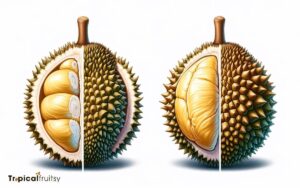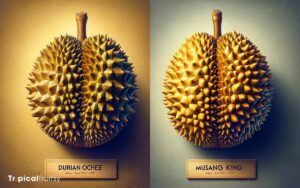Is Durian Fruit an Aphrodisiac? Unlocking the Myth!
Durian fruit is often cited as an aphrodisiac, but scientific evidence to support this claim is limited. It is rich in compounds that may influence libido, yet the effect is largely anecdotal.
The reputation of durian fruit as an aphrodisiac is rooted in Southeast Asian culture, where it has been consumed for centuries.
The belief may stem from:
However, scientific studies specifically investigating durian’s aphrodisiac effects are scarce.
Nutritional content that supports general health may contribute indirectly to sexual health, but there is no direct link proving durian’s efficacy as a sexual stimulant. While durian’s aphrodisiac reputation is intriguing, definitive scientific validation remains elusive.

Key Takeaway
Durian Fruit Nutritional Profile and Potential Aphrodisiac Effects
| Nutrient | Presence in Durian | Potential Aphrodisiac Effect |
|---|---|---|
| Carbohydrates | High | Provides energy |
| Protein | Moderate | Supports stamina |
| Fats | Moderate | Essential for hormone production |
| Tryptophan | Present | Precursor to serotonin |
| Vitamin B6 | Present | Aids in serotonin production |
| Potassium | High | Beneficial for muscle function |
| Vitamin C | High | General health benefit |
| Antioxidants | Present | May improve overall well-being |
Understanding Aphrodisiacs
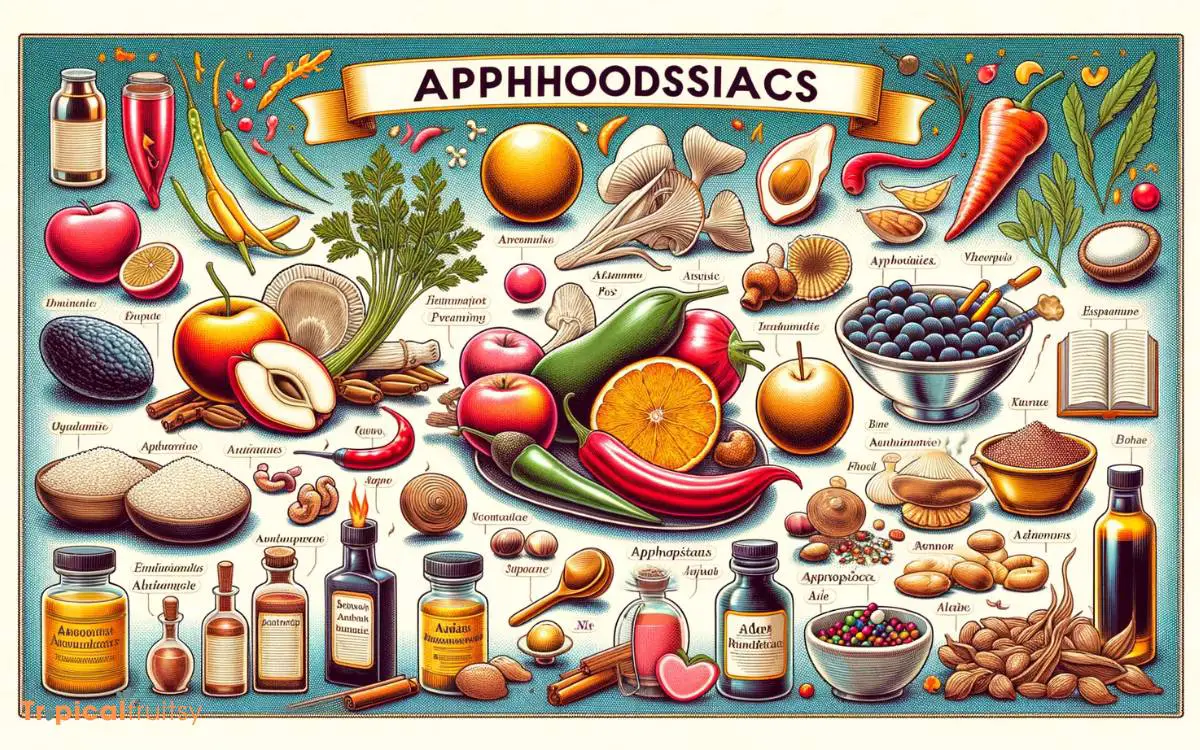
In the realm of human sexuality, aphrodisiacs are substances purported to enhance sexual desire or performance.
These agents can be classified into two categories: those with pharmacological effects and those with a placebo effect.
Pharmacologically active aphrodisiacs may alter body chemistry to increase libido, such as by modulating hormone levels or improving blood flow.
Placebo aphrodisiacs rely on belief and expectation, which can have a significant psychological impact on sexual desire.
Empirical research into the efficacy of purported aphrodisiacs is imperative to substantiate claims.
Studies typically focus on measuring changes in sexual function and desire, often using validated questionnaires or physiological assessments.
The scientific scrutiny of these substances helps to distinguish between myth and evidence-based effects on human sexuality.
Durian Fruit Profile
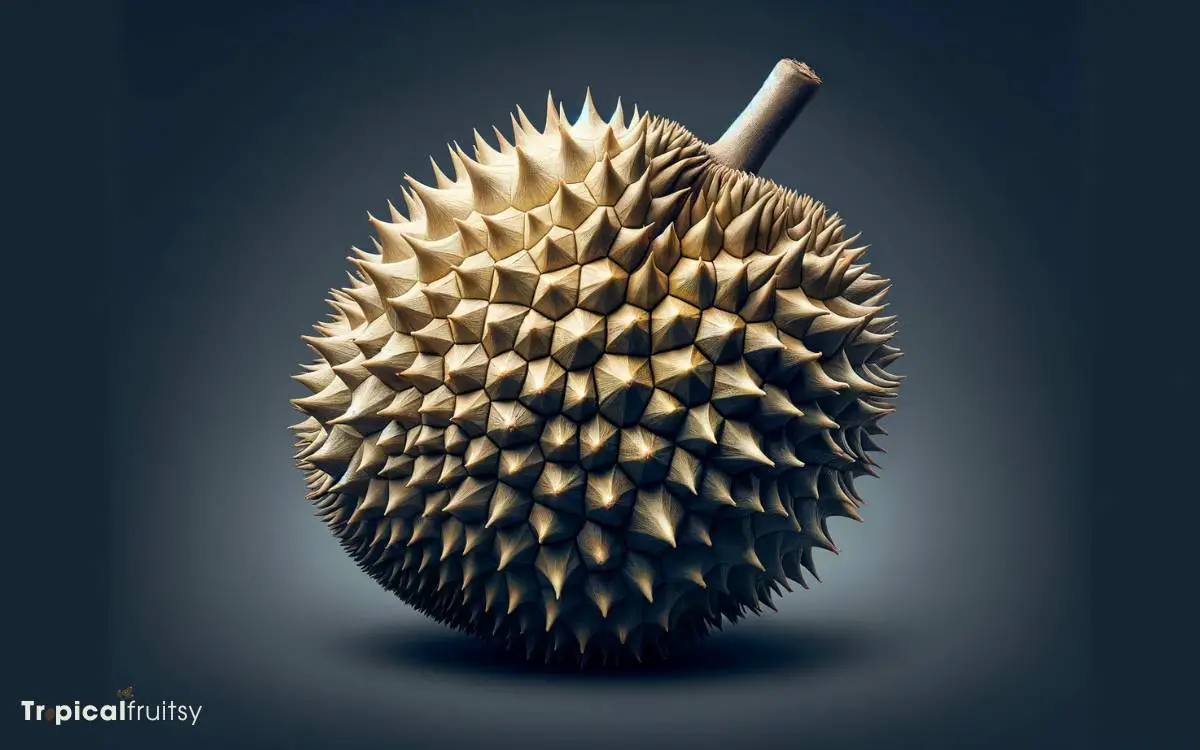
While known for its pungent aroma, the durian fruit also possesses a unique nutritional profile that has sparked interest in its potential aphrodisiac properties.
Scientific analysis reveals that durian is rich in vitamins and minerals, notably vitamin C, potassium, and essential amino acids which are critical for maintaining physiological functions.
Additionally, durian contains compounds like tryptophan, which is a precursor to the neurotransmitter serotonin, involved in mood regulation and sexual desire.
The presence of these bioactive components suggests a theoretical basis for its purported aphrodisiac effects.
However, empirical research into the correlation between durian consumption and enhanced libido or sexual performance is limited.
Thus, while the nutritional content of durian is well-documented, its role in sexual health requires further scientific substantiation.
Historical Aphrodisiac Uses
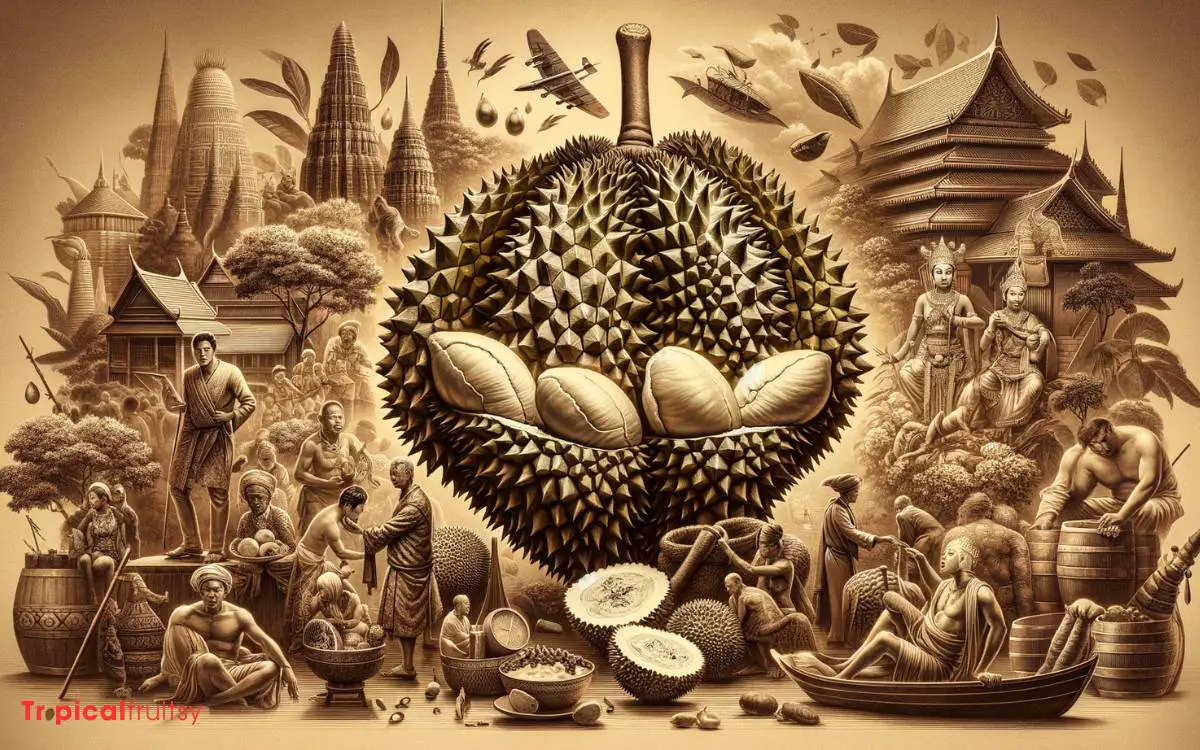
Durian fruit’s reputation as an aphrodisiac dates back centuries in Southeast Asian cultures, where it has been traditionally consumed for its purported libido-enhancing properties.
The evidence for such claims, while largely anecdotal, is rooted in the region’s ethnomedical practices.
To elucidate, a comparative table of historical uses is provided below:
| Region | Usage | Noted Effects |
|---|---|---|
| Malaysia | Festive aphrodisiac | Sociocultural enhancement of virility |
| Indonesia | Conjugal rituals | Increased sexual desire |
| Thailand | Traditional medicine | Supposed fertility boost |
| Singapore | Culinary indulgence | Perceived vigor restoration |
| Philippines | Folk remedy | Enhanced intimacy experiences |
While empirical research is sparse, the fruit’s high nutritional content, including fat and sugar, could theoretically contribute to increased energy levels, potentially supporting its historical aphrodisiac use.
Chemical Composition Breakdown
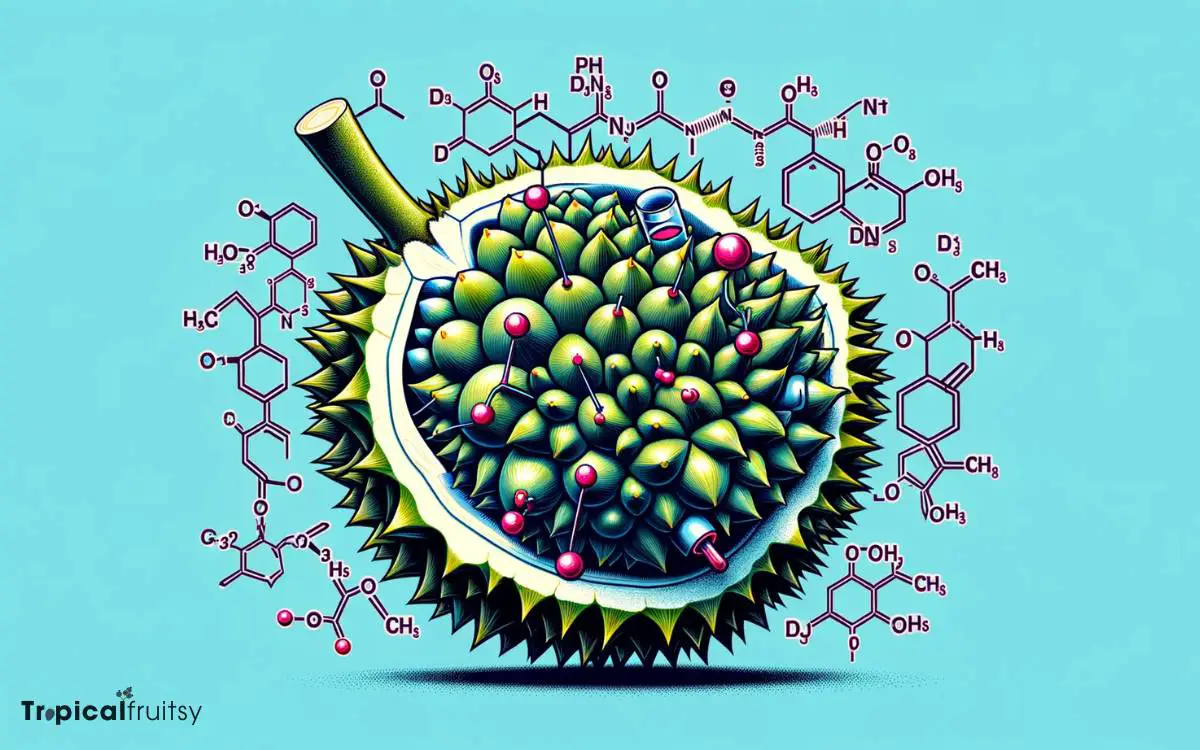
The chemical composition of durian fruit includes a complex array of compounds, some of which are thought to influence human physiological responses related to sexual health.
Primary among these compounds are sulfur-containing volatiles, which impart its characteristic odor and may stimulate libido through olfactory pathways.
Durian also contains high levels of tryptophan, an essential amino acid that serves as a precursor to serotonin, a neurotransmitter linked to mood and sexual desire.
Additionally, the presence of compounds such as potassium, which aids in muscle function and blood pressure regulation, could theoretically enhance sexual performance by promoting better circulation.
Notably, the fruit’s rich content of vitamin C and other antioxidants might contribute to overall health, indirectly supporting sexual health.
Each compound’s role, however, necessitates further empirical study to substantiate aphrodisiac claims.
Scientific Evidence Examined
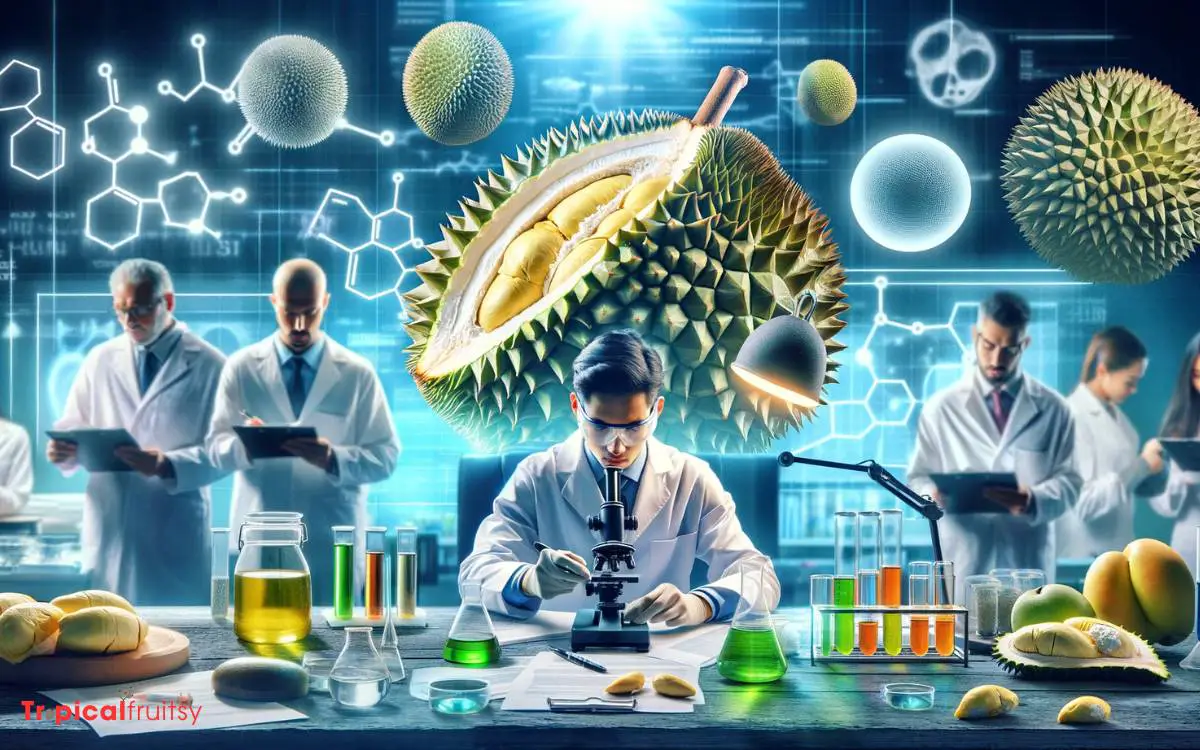
In examining the aphrodisiac properties of Durian fruit, various research studies have been scrutinized for empirical data linking its consumption to sexual arousal or activity.
These investigations often focus on specific chemical compounds present in the fruit that may have a physiological impact on libido.
The following analysis will synthesize findings from peer-reviewed research to ascertain the validity of claims surrounding Durian fruit’s potential as a natural aphrodisiac.
Research Studies Reviewed
Although several anecdotal claims suggest durian fruit acts as an aphrodisiac, only a limited number of scientific studies have systematically investigated this potential effect.
Research has primarily focused on the biochemical composition of durian, assessing the presence of compounds that could theoretically influence human libido.
One such study, published in the Journal of Ethnopharmacology, examined the phytochemicals in durian and their potential role in sexual health.
However, the evidence remains inconclusive, as the physiological impact of these compounds has not been extensively correlated with sexual arousal or performance in humans.
Furthermore, existing literature often lacks rigorous methodological designs, such as randomized controlled trials, which are necessary to establish a causal relationship between durian consumption and aphrodisiac effects.
Chemical Compounds Identified
Delving into the chemical makeup of durian fruit, researchers have isolated several compounds that may contribute to its reputed aphrodisiac qualities.
These bioactive components are believed to influence physiological pathways related to sexual function.
The presence of these chemicals has been substantiated through various chromatographic and spectrometric methods, providing a quantitative basis for their potential effects.
| Compound | Properties | Potential Aphrodisiac Mechanism |
|---|---|---|
| Tryptophan | Precursor to serotonin | May enhance mood and libido |
| Ethyl esters | Volatile aroma components | Could stimulate olfactory-induced arousal |
| Sulfur compounds | Contribute to distinct smell | Possible role in pheromone-like activity |
The investigation into these substances presents a methodical approach to understanding how the durian fruit may exert its purported effects on sexual desire and performance.
Effects on Libido
Scientific studies investigating the impact of durian fruit on libido have yielded mixed results, with some research suggesting potential aphrodisiac properties while others find minimal or no effect.
These studies often focus on the fruit’s high content of compounds such as sulfur and various esters, which are posited to influence sexual desire and performance.
However, the methodologies used in these studies vary widely, with some relying on animal models, while others assess the effect on human subjects through self-reported measures.
This variability contributes to the inconclusive nature of the scientific evidence. Quantitative analysis and controlled experimental designs are required to establish a causal relationship between durian consumption and changes in libido.
Personal Testimonies Reviewed

When considering the potential aphrodisiac qualities of durian fruit, numerous personal accounts have been documented, purporting enhanced sensual experiences post-consumption.
These subjective reports, while compelling, require critical examination against established scientific measures of aphrodisiac efficacy to discern any placebo effects from verifiable results.
It is imperative to review these testimonies with an analytical approach, assessing the consistency and reliability of the claimed benefits across diverse individuals.
Anecdotal Experiences Shared
Durian consumption stories, often shared in intimate settings, suggest that some individuals perceive the fruit as having aphrodisiac properties.
These personal accounts, while not scientifically substantiated, provide a narrative that some believe reflects the fruit’s sensual effects.
- Individuals recount improved libido and sexual stamina following durian consumption, suggesting a link between the fruit’s nutritional profile and sexual health.
- Couples often share experiences of heightened sensuality after eating durian, attributing it to the fruit’s unique aroma and texture.
- Some testimonials include a sense of warmth and flush, a physiological response that may be mistaken for or contribute to the perception of aphrodisiac effects.
An analytical review of these anecdotes requires a critical evaluation of the psychological and physiological responses to durian consumption, distinguishing between placebo effects and any bioactive components that may influence sexual function.
Sensual Benefits Claimed
We have examined an array of personal testimonies that tout the durian fruit’s reputed sensual benefits, including claims of enhanced libido and sexual pleasure.
These accounts, while compelling, require scientific scrutiny to substantiate the correlation between durian consumption and sexual health enhancement.
| Respondent Profile | Frequency of Consumption | Reported Benefit |
|---|---|---|
| Mid-30s Female | Bi-monthly | Increased Desire |
| Late-40s Male | Weekly | Prolonged Stamina |
| Early-20s Couple | Occasional | Heightened Sensation |
Cross-referencing these self-reported experiences with established research, we find a lack of empirical evidence definitively linking durian with aphrodisiac properties.
However, the high nutritional value of durian may contribute to overall vitality, which in turn could influence sexual health. Further scientific investigation is warranted to explore these claims.
Cultural Beliefs and Traditions

Many cultures in Southeast Asia regard durian fruit as a potent aphrodisiac, attributing to it the power to increase sexual desire. This belief is deeply entrenched in local customs and often linked to historical practices and traditional medicine.
The perception of durian as an aphrodisiac is not merely anecdotal; it is part of a broader cultural fabric that associates certain foods with enhanced libido.
To illustrate:
- In some regions, durian is traditionally consumed during wedding feasts to promote fertility and conjugal bliss.
- Folk medicine practitioners sometimes recommend durian to individuals seeking to improve their sexual health.
- Festivals and celebrations may feature durian due to its symbolic association with love and vitality.
The aphrodisiac qualities attributed to durian fruit lead to a discussion of its potential health implications, both beneficial and adverse.
Potential Health Implications

Following the cultural endorsement of durian fruit as an aphrodisiac, it is crucial to examine its actual health implications, which range from nutritional benefits to potential risks.
Durian is a calorie-dense fruit, rich in carbohydrates, vitamins, and minerals, particularly vitamin C, potassium, and magnesium. Its high dietary fiber content facilitates bowel regularity and may contribute to reduced cholesterol levels.
However, durian contains significant amounts of sulfur compounds, which can influence the metabolism of certain medications, necessitating caution among individuals on drug therapy.
Furthermore, its high glycemic index may not be suitable for diabetics. Overconsumption can lead to weight gain due to its caloric content.
Allergic reactions, though rare, are also a consideration. Thus, while durian has nutritional merits, it should be consumed with mindfulness of its potential health effects.
Alternatives and Comparisons
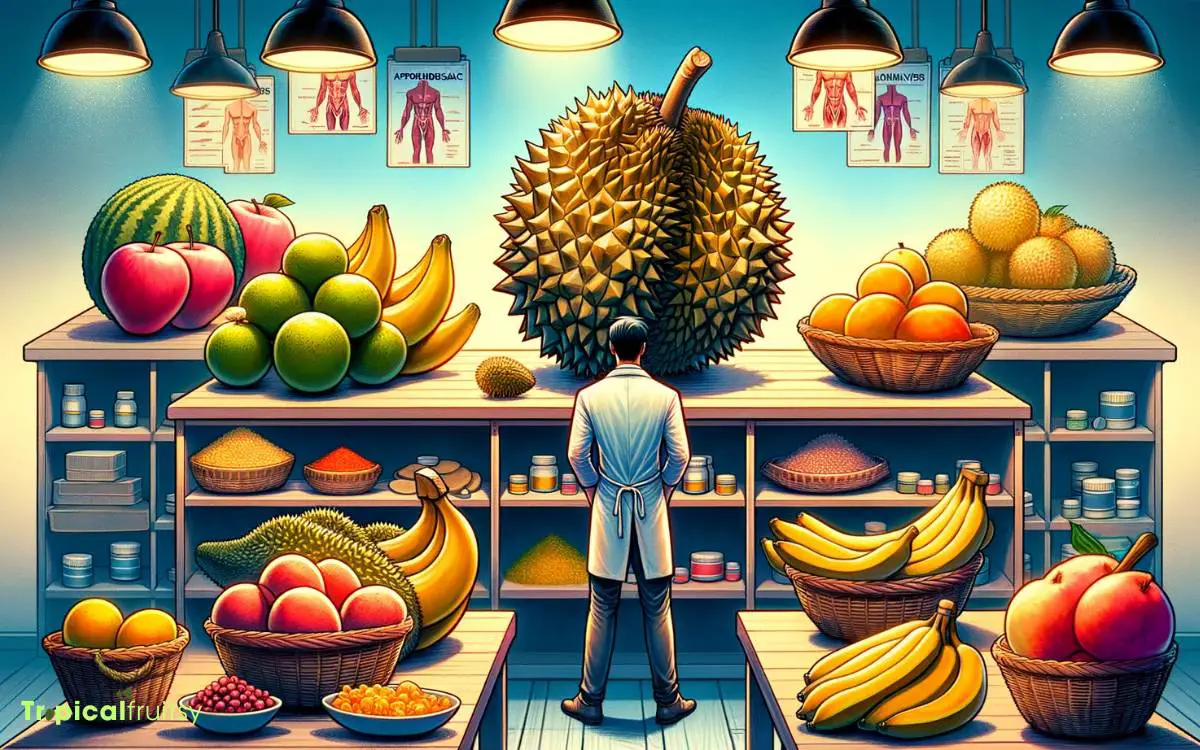
While durian is often hailed for its aphrodisiac qualities, other foods such as oysters, chocolate, and figs have also been historically celebrated for their libido-enhancing properties.
These foods contain various compounds that have been studied for their potential effects on sexual desire and performance.
- Oysters: Rich in zinc, which is crucial for testosterone production and reproductive health.
- Chocolate: Contains phenylethylamine and serotonin, chemicals thought to affect mood and promote feelings of attraction.
- Figs: Symbolize fertility in some cultures and are high in amino acids, which may increase libido.
The analytical comparison of these foods involves evaluating the presence and concentration of active compounds, their known physiological effects, and the scientific evidence supporting their traditional use as aphrodisiacs.
Understanding the mechanisms behind these foods can help in discerning their actual effectiveness in enhancing libido.
Conclusion
While durian fruit’s reputation as an aphrodisiac is entrenched in cultural beliefs and anecdotal accounts, scientific scrutiny reveals a complex chemical composition with potential implications for human sexual health.
The interplay of tradition and biochemistry invites further investigation, hinting at undiscovered truths behind this controversial fruit’s effect on human desire.
The quest for understanding continues, promising insights that may yet validate or challenge centuries-old assertions of durian’s aphrodisiac properties.





